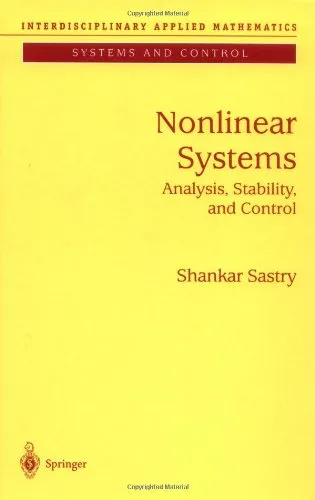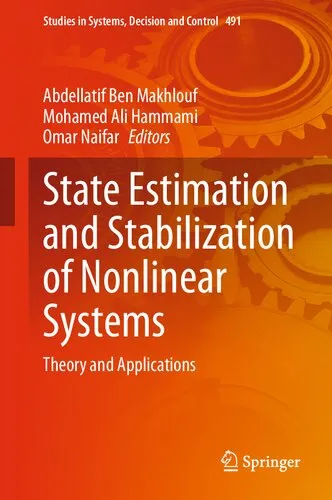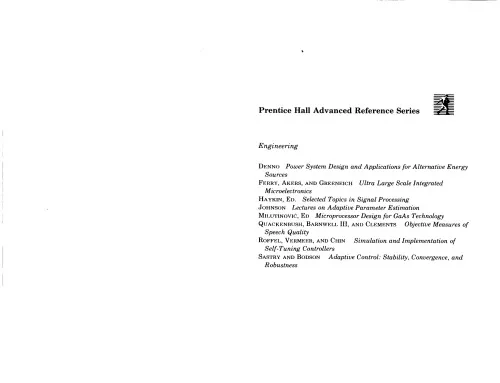Stability and Stabilization of Nonlinear Systems
4.5
Reviews from our users

You Can Ask your questions from this book's AI after Login
Each download or ask from book AI costs 2 points. To earn more free points, please visit the Points Guide Page and complete some valuable actions.Related Refrences:
Introduction to 'Stability and Stabilization of Nonlinear Systems'
The field of nonlinear systems presents a fascinating and challenging domain in mathematical control theory, offering profound insights but also posing intricate technical challenges. The book 'Stability and Stabilization of Nonlinear Systems' serves as an indispensable reference for researchers, practitioners, and students interested in gaining a comprehensive understanding of modern nonlinear system theory. Authored and edited by experts in the field, this book encapsulates foundational principles, advanced methodologies, and practical techniques to address the core problem of ensuring stability and designing stabilization mechanisms for nonlinear systems.
Nonlinear systems, being pervasive in both natural phenomena and technological applications, demand rigorous theoretical frameworks to ensure their robustness and controlled behavior. This comprehensive volume offers a structured exploration of stability analysis techniques, Lyapunov methods, stability criteria, and various stabilization strategies, while connecting theory to real-world applications. Whether you are seeking a solid theoretical foundation or practical tools, this book equips you with the knowledge required to navigate the challenges inherent to nonlinear dynamics.
Detailed Summary of the Book
The book begins by laying out the fundamentals of nonlinear system theory, providing the tools necessary for a rigorous analysis of stability. It delves deeply into Lyapunov stability theory, invariant sets, and LaSalle’s invariance principle, building the analytical framework essential for exploring nonlinear dynamical systems. Readers are introduced to various methods of studying stability, such as input-output stability, Krasovskii's method, and passivity-based designs.
As the text progresses, it introduces key concepts such as feedback stabilization, observer design, and robust control for nonlinear systems. Each section provides clear mathematical formulations, illustrative examples, and instructive proofs, ensuring readers can apply these techniques in diverse contexts. Attention is also given to systems with uncertainties, providing robust and adaptive control methodologies—practical tools for addressing real-world complexities in nonlinear systems.
The book also explores connections between nonlinear system theory and emerging applications. From robotics to aerospace systems, from chemical processes to smart grids, the theoretical tools discussed across the chapters have far-reaching implications. Practical implementation concerns, computational methods, and software tools are discussed in service of making these concepts accessible to industry professionals and academic researchers alike.
Key Takeaways
- Comprehensive understanding of Lyapunov stability theory and its extensions.
- Detailed exploration of feedback stabilization techniques for nonlinear systems.
- Robust control methods for handling uncertainties and disturbances.
- Illustrative examples and case studies providing practical context.
- Connections between theory and applications in complex, real-world systems.
- Fundamental tools for advanced research on modern control theory.
Famous Quotes from the Book
"Stability is not merely a desirable property of a system—it is a necessity for its sustained functionality."
"The challenge of stabilization is not solving theoretical equations alone, but achieving control in the face of real-world complexities."
Why This Book Matters
The importance of 'Stability and Stabilization of Nonlinear Systems' lies in its depth and breadth of coverage in a field that holds essential importance across numerous disciplines. In today’s world, nonlinear systems govern the behavior of critical applications ranging from self-driving cars to renewable energy systems. Understanding their stability ensures that such systems perform optimally, safely, and reliably under varying conditions.
This book stands out for its ability to bridge theoretical rigor with practical implementation. By providing systematic approaches to stability analysis and control design, it empowers professionals and scholars to address challenges proactively. Furthermore, the insights from this work remain relevant as new technologies evolve, reinforcing its value as a timeless resource.
In summary, this book is not only a treatise on theory but also a manual for engineers, scientists, and mathematicians striving to harness the power of nonlinear systems. Its ability to combine intuition, mathematics, and application makes it an essential addition to any technical library.
Free Direct Download
You Can Download this book after Login
Accessing books through legal platforms and public libraries not only supports the rights of authors and publishers but also contributes to the sustainability of reading culture. Before downloading, please take a moment to consider these options.
Find this book on other platforms:
WorldCat helps you find books in libraries worldwide.
See ratings, reviews, and discussions on Goodreads.
Find and buy rare or used books on AbeBooks.
1255
بازدید4.5
امتیاز50
نظر98%
رضایتReviews:
4.5
Based on 0 users review
"کیفیت چاپ عالی بود، خیلی راضیام"






























